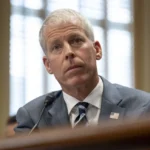FRIDAY FOCUS: New Wyoming Energy Authority Leader Keeps His Eyes on the Big Picture
Rob Creager shares his journey from policy advisor to state energy leader
- Published In: Other News & Features
- Last Updated: Jun 16, 2023

Rob Creager served as policy advisor to Gov. Mark Gordon before becoming executive director of the Wyoming Energy Authority in May. (Courtesy photo from the Wyoming Energy Authority).

This story has been updated to correct the name of a technology company in Gillette on June 16 as of 8:30 a.m. MT.
By David Dudley
Special to the Wyoming Truth
Rob Creager is a University of Wyoming graduate who bucked a trend: He decided to build a career in his home state.
“I wanted to prove that you don’t have to leave the state to find challenging, fulfilling work,” said Creager, new director of the Wyoming Energy Authority (WEA). “You can stay. And you can achieve great things here.”
Creager, 27, earned a bachelor’s degree in finance and economics in 2018. He worked as a field representative on Gov. Mark Gordon’s 2018 campaign and then joined the governor-elect as a policy advisor.
“We had big plans for economic reform in 2020,” Creager said. “Then the pandemic came along and derailed all of that.”
As federal aid was disbursed nationwide, Creager oversaw $600 million in relief funds—most of which went to small businesses.
“We worked to increase broadband connectivity,” he said. “To ensure that those who lost their jobs had access to unemployment benefits. That’s the greatest thing I accomplished during my time with the governor’s office.”
The Wyoming Truth spoke with Creager about sources of energy, how they support the economy and the future of energy in Wyoming. What follows are excerpts from the conversation.
How did a policy advisor with a degree in finance and economics land the top job at the Wyoming Energy Authority?
Creager: Energy is the largest economic sector in the state. My understanding of the way markets function is an asset. And my understanding of policy, whether state or federal, helps, too. Understanding what those price sensitivities and production sensitivities are to the state. Knowing that a $5 dip in oil prices is roughly a $55 to $60 million hit to state and local coffers. That’s a big deal. Also, the network I have built up over the past five years. I’ve worked very closely with the Wyoming Business Council, with the Oil and Gas Conservation Commission.
What are some of your goals?
Creager: I want to emphasize, and really push, education and advocacy of what we are doing here in the state of Wyoming on all energy fronts. We’ve got to explain to folks that may have a different stance than we do on things like fossil fuels what we are doing. And how that is actually beneficial for consumers as well as the climate.
Are you facing challenges as you pursue your goals?
Creager: One of the big ones is that we’ve got a team of five. There are a lot of projects we’re looking at, and we have a very small team. I’ve spoken to many legislators, spoken to my former boss about this. And I’ve said: “Don’t be surprised if, come appropriation season, I come forward with a few asks for some positions.” If you look at most energy offices around the country, the sweet spot is from 10 to 15 people. I’m not gonna come asking for 10 positions, but a few more positions to make sure the second-largest energy economy in the country is represented as such.
We want to bolster the extractive industries, which will drive data, technology and infrastructure investments. To do that, we’ve got to show folks what these policies mean for the cost of your electricity, the workforce, and the economy.
How do federal policies impact Wyoming’s energy market?
Creager: On the energy front, the administration doesn’t look fondly on some of our energy sources here in Wyoming. I think that’s too bad. We can put forward what we’re doing with our coal fleet, what we’re doing with natural gas, with oil. We’re also looking at wind, solar, hydrogen and nuclear. We’re working to diversify our energy sources, which will bolster the market.
Which policies?
Creager: Well, when we look at permitting and transmission, that’s something our D.C. policy makers need to grapple with. You know, in my former role, I oversaw the Infrastructure Investment and Jobs Act. My message was, whether you want green energy or fossil fuels, or an infrastructure project, you have to fix permitting. Otherwise, infrastructure projects won’t get done on the timelines they’re on.
When President Biden took office, he implemented an oil and gas leasing moratorium. . . . But Wyoming’s got such large oil reserves, 90% of which are on federal land. So that’s a huge issue for us, given the amount of jobs, and the revenue the state gets from that. If you look at the Jonah Field, and the responsibly sourced gas they’re producing out there, and exporting to California, that’s something to consider. California wants lower emissions and those sort of things. We’re already doing that here in Wyoming.
What forms of energy could the WEA and Wyoming increase?
Creager: The work we’ve done on carbon capture utilization, sequestration. I think that is the ticket for us to keep our coal-fired power plants around and operational for a long time to come. We have the technology to reduce coal’s carbon footprint, down to what you might see with a wind farm or a solar farm. We have those reserves here in the state, and we should use every ounce of them.
With the Kemmerer project, we’re looking to increase our nuclear capacity. And then hydrogen as well. We want to partner with people from the business council, and the business community, to make sure these aren’t just one-off projects. That this is a macro benefit to the state that will keep jobs here in the long-term.
What forms of energy could be phased out?
Creager: Folks are hoping for cooler summers, warmer winters, but they want to phase out certain fuels. That’s a risky hand to play. If you look at what we’re doing with fossil fuels, we can achieve some of our environmental goals, while also maintaining security, reliability and keeping costs down for consumers. The alternative could lead to higher prices or blackouts. If that happens, folks are going to be looking at their policymakers, and asking: “Why is this happening?”
What about the studies saying that Wyoming has the third-highest per capita energy usage rate?
Creager: Wyoming is a blue- collar state. I grew up on a ranch outside of Casper, and the machinery that we used required a lot of energy. Some of the advanced manufacturing that’s moving into the state, like the data centers, require a lots of energy. That’s not a problem. We have the energy to supply it. And I think folks outside of Wyoming might not realize that the food on their plate, or some of the social media platforms they use, a lot of that stuff is happening in Wyoming. L&H, up in Gillette, is building pieces that are used on NASA equipment. Those things are energy intensive, but again, I would argue that we produce it as responsibly as possible. We’re also one of the least populated states. We export 80%-90% of our energy. So, a lot of people and a lot of places depend upon us for things that are for the greater good.
What’s the future of energy in Wyoming?
Creager: I am a firm believer state policy is really where we can move the needles. I’m a big federalist guy. I think most of the power should be in the hands of each state. I’d like to bring in legislators from surrounding states, as well as from afar, to show them what we do here. We are incredibly blessed here in Wyoming, to have what we have, under our feet and above, as it relates to energy. I think there’s a lot of opportunity, and that’s one thing that excites me so much, being a Wyoming guy.













